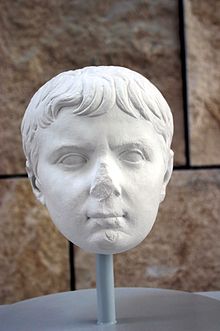Gaius Caesar
| Gaius Caesar | |||||
|---|---|---|---|---|---|

Gaius Caesar
|
|||||
| Born | 20 BC Rome |
||||
| Died | 21 February 4 AD Lycia |
||||
| Burial | Mausoleum of Augustus | ||||
| Spouse | Livilla | ||||
|
|||||
| Father |
|
||||
| Mother | Julia the Elder | ||||
| Full name | |
|---|---|
| Birth to adoption: Gaius Vipsanius Agrippa After adoption: Gaius Julius Caesar |
| Roman imperial dynasties | |||
| Julio-Claudian dynasty | |||
| Chronology | |||
| Augustus | 27 BC – 14 AD | ||
| Tiberius | 14–37 AD | ||
| Caligula | 37–41 AD | ||
| Claudius | 41–54 AD | ||
| Nero | 54–68 AD | ||
| Family | |||
|
Gens Julia Gens Claudia Julio-Claudian family tree Category:Julio-Claudian dynasty |
|||
| Succession | |||
|
Preceded by Roman Republic |
Followed by Year of the Four Emperors |
||
Gaius Julius Caesar (20 BC – 21 February AD 4), most commonly known as Gaius Caesar or Caius Caesar, was the oldest son of Marcus Vipsanius Agrippa and Julia the Elder. He was born between 14 August and 13 September 20 BC or according to other sources on 23 September 20 BC. Originally named Gaius Vipsanius Agrippa, when he was adopted by his maternal grandfather the Roman emperor, Augustus, of the Julian gens, his name was accordingly changed to Gaius Julius Caesar.
Although Roman adoption practices may imply the use of the cognomen Vipsanianus, there is no literary or material evidence to indicate that this cognomen was ever used by any of Agrippa's sons adopted by Augustus.
Gaius was adopted along with his brother Lucius Caesar in 17 BC by their maternal grandfather, the Roman Emperor Augustus, who named the two boys as his heirs. In 6 BC the Roman plebs agitated for Gaius to be created consul, despite the fact that he was only 14 and had not yet assumed the toga virilis. As a compromise, it was agreed that he should have the right to sit in the Senate House, and he was made consul designatus with the intention that he should assume the consulship in his twentieth year. Gaius was at this point created "Youth Leader" ("princeps iuventutis"), an honorific that made him one of the symbolic heads of the equestrian order. Lucius, three years his junior, was granted the same honours after the appropriate interval had elapsed. Temples and statues were erected in their honour (as in the case of the Maison Carrée in Nîmes).
In 1 BC he was made army commander in the East and made a peace treaty with Phraates V on an island in the river Euphrates. In the same year, he married his second cousin, Livilla, daughter of Drusus the Elder and Antonia Minor. This union had no issue.
...
Wikipedia
